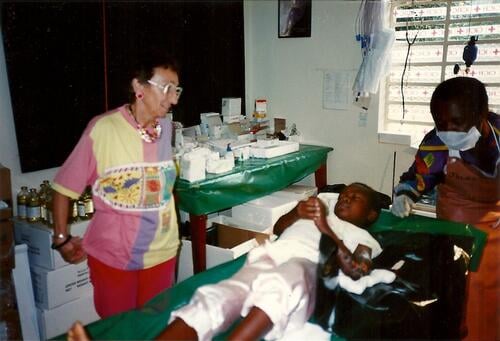For the first time in 20 years, nurse anesthetist Madeleine Boyer describes her recollections of her two consecutive missions to Kigali in 1994. She arrived there on April 13, was evacuated three weeks later but returned in a few days. She remained in Kigali until forces under the control of current Rwandan President Paul Kagamé arrived. Images from that time remain engraved in her memory.
“I was already in Burundi on mission with Maurice Meunier, the surgeon, when the plane carrying the Rwandan and Burundian presidents was shot down in Kigali on April 6, 1994. MSF immediately asked us to leave for Kigali with the joint MSF-ICRC convoy to set up a hospital. I remember that we installed the operating room in a catechism classroom because the building was run by nuns! We had plenty of wounded patients. And then one day we were evacuated, but I came back very soon after that. We slept in a cement hallway, which offered a little protection. There were a huge number of wounded people. I have painful memories of them.
I stayed for a month, during the war. On July 4, when the Rwandan Patriotic Front captured the city, Paul Kagamé himself came to our hospital [which was located in the area under government control.]I was really afraid that his men would kill all of our patients. We’d already seen our patients killed before our eyes so many times before. So I asked all the patients to take off their clothes. When they were naked, no one could tell whether they were Hutu or Tutsi. He came into the unit. Everything went fine. He treated all the wounded patients respectfully. And then we had to leave the hospital the next morning.
It was shocking to come face-to-face with our own powerlessness
We saw so many wounded people and dead bodies. It was shocking to come face-to-face with our own powerlessness. One day, 400 wounded people arrived at the hospital, one after another. There were so many people that we had to set them up in the parking lot, each with a blanket, but there were not enough of us to treat all of them. The next morning, nearly all of them were dead. They had been killed in the night. It’s been 20 years and I’ve never talked about it. Not even to my family. Out of a sense of decency. Because I was afraid it would make others suffer. I remember one of my uncles, who was in World War I – he fought at the Chemin de Dames [a major WWI battle site]. He experienced all of that. I was 4 or 5 and he used to swing me up on his knees. He never spoke to us about the war and the awful things he’d experienced. So it must run in the family. We don’t talk about things that are hard to recount.
The brutality was incredible
I have only wonderful memories of the part of my life that MSF represents – remarkable times of happiness, love, shared experiences. I was in South Sudan on my first mission when I learned that I had become a grandmother for the first time! I have five children and I had asked their permission to go. There was no telephone and the mail was extremely slow. I arrived there in October and received my first letter in January. That was what was most difficult – being so far from the family without any way to make contact. I stayed in South Sudan for five months. There was nothing there. We managed – we ate lots of bananas, but we accepted it willingly.
Then Kosovo, Chechnya, Mogadishu – I was there three or four times. It was awful, too. There were so many wounded patients that we had to choose who we could save because we couldn’t treat everyone. At times like that, you don’t ask yourself any existential questions. There’s no politics, no religion – just us, that’s all. You can’t do anything there’s else. But Rwanda – the brutality was really incredible. We were afraid. They were killing patients in front of us. That is something you can’t stomach.”



